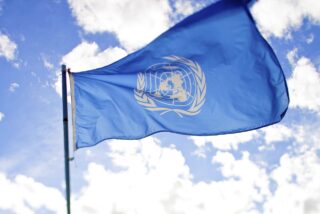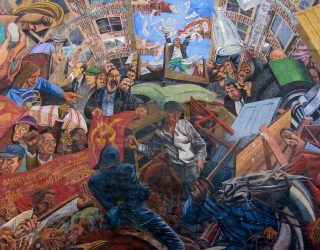Allegations of sexual abuse and exploitation at the hands of UN peacekeeper forces involve incidents across country borders, spanning years. A report released last June said at least 480 allegations of sexual exploitation and abuse had been made between 2008 and 2013, with one-third involving children, while there are a number of allegations before and after that period.
With Secretary-General Ban Ki-moon in his last few months in the position (interviews are already underway for his replacement), there has been increased pressure from a campaign led by members of Media Diversified for his legacy to be one of tackling the #PredatoryPeacekeepers scandal once and for all.
Reports from the Central African Republic include crimes from 2013 to 2015
In the wake of this pressure, on March 29th all senior-level actors including Under-Secretaries-General Anthony Lake, Executive Director of UNICEF; Jane Holl Lute, Special Coordinator on Improving the United Nations Response to Sexual Exploitation and Abuse; and Miguel de Serpa Soares, Legal Affairs and Legal Counsel, were called by Ban Ki-moon’s Chef de Cabinet, Edmond Mulet, to an urgent crisis meeting on the recently disclosed reports from the Central African Republic (CAR). These include crimes from 2013, 2014 and 2015 that may have been perpetrated by a combination of non-UN and UN peacekeeping personnel.
AIDS-Free World’s Code Blue campaign cited the decisions reportedly made at the meeting in a recent press release. They included:
- Allocating approximately 10 per cent of UNICEF’s remaining annual budget to augment response capacity in CAR.
- The UN mission in CAR, MINUSCA will provide funding to be used for victim assistance – including transportation, medical support and emergency psycho-social care.
- A victims’ assistance trust fund administered in New York will seek contributions from Member States
- “Integrated/multidisciplinary assessment teams” including staff from the Office of Internal Oversight Services, MINUSCA’s Human Rights Office, UNICEF and the UN Population Fund will be sent to investigate in remote areas of CAR alongside additional members being dispatched to support urgent investigations in the coming days.
It’s been a long time coming that senior-level officials in the UN begin to make more public calls that action be taken (however imperfect). An explanation for the delay may be found in looking back at how internal allegations have been handled in the past.
Kompass’ whistleblowing led to his emails being seized, his subsequent suspension and months of uncertainty over his career
Anders Kompass, the human rights official turned whistleblower
In April 2015, Anders Kompass was suspended from his post as director of field operations in the Central African Republic (CAR), accused of leaking a confidential UN report and thereby breaching protocols. The report, entitled “Sexual Abuse on Children by International Armed Forces” and stamped confidential on every page, contained harrowing details of the rape and sodomy of starving and homeless children between December 2013 and June 2014.
The incidents took place at a centre for internally displaced people at M’Poko airport in Bangui, capital of the Central African Republic. The report was passed to officials in summer 2014 but Kompass later became frustrated by the lack of action and sent the report to French authorities to push for investigations. It was this move that sparked an internal investigation into Kompass’ actions, which involved his emails being seized, his subsequent suspension and months of uncertainty over his career. AIDS-Free World’s Code Blue campaign has said:
“Leaked emails relating to Mr. Anders Kompass made it clear that… [senior figures] went to great lengths to try and have Mr. Kompass fired for daring to report crimes to the French government responsible for investigating. Those officials showed no such energy to ensure that perpetrators were being held responsible.”
Kompass has since been cleared of all charges by the investigation run by the Office of Internal Oversight (OIOS).
Speaking to the Guardian he said: “It is important for other staff to see that I was vindicated… because otherwise the message was: ‘If you try to do something similar to what Anders has done these will be the consequences.’”
Bolkovac uncovered a murky network of relationships between local police, bar owners and UN staff
Kathryn Bolkovac, the former Nebraskan police officer who exposed UN employees’ role in human trafficking and prostitution
Bolkovac’s story may have reached a wider audience through the 2010 biographical film The Whistleblower, with the UN itself even staging a special screening. In the late 1990s, Bolkovac was recruited to work in Bosnia and Herzegovina for Dyncorp, to which UN peacekeeping police work had been outsourced.
Through her work with cases of domestic violence she was later appointed head of the department of gender affairs, coming into contact with the leading UN officer for gender issues, Madeleine Rees. Bolkovac’s work involved large numbers of women and girls who had been the victims of rape during the war. During her post she uncovered a murky network of relationships between local police, bar owners who forged passports attempting to hide trafficked girls as employees, and UN staff. Speaking to the Observer, she said:
“The thing that stood out about these cases… [is] that police and humanitarian workers were frequently involved in not only the facilitation of forced sexual abuse, and the use of children and young women in brothels, but in many instances became involved in the trade by racketeering, bribery and outright falsifying of documents as part of a broader criminal syndicate.”
“Over and over and over again, the UN goes into denial, into dismissal and into coverup”
After getting girls’ testimonies on record and taking her concerns up the chain of command, she subsequently found herself blocked, stonewalled, threatened, demoted and later sacked for allegedly falsifying a timesheet – having her ID removed, banning her from UN buildings. With the aid of Madeleine Rees and internal-affairs specialist Peter Ward, Bolkovac was able to get documents of her investigation out of the country. With the help of lawyer Karen Bailey, she used the fact her contract was governed under English law to challenge her dismissal in an employment tribunal, which subsequently ordered Dyncorp to pay her £110,221. The trial helped open up a wider conversation about her experiences.
Whistleblower protections in the future?
These two stories provide a brief snapshot of the challenges that have been faced by those seeking to call out wrongdoing and heinous acts. James Wasserstrom, former top anti-corruption official and veteran US diplomat has said in the past that Kompass’ case offers further evidence of the UN’s “reckless disregard for very serious allegations of wrongdoing in order to go after the whistleblower… [O]ver and over and over again, the UN goes into denial, into dismissal and into coverup, and then tries to retaliate against the whistleblower.”
Wasserstrom co-signed a letter, alongside nine former whistleblowers, addressed to the UN Secretary-General and UN Executive Heads. In it they argued:
“Without proper whistleblower protection, wrongdoing at the United Nations, be it sexual exploitation, abuse of power, fraud or corruption, will not be reported and will continue to go unchecked. There will be no accountability. This can only damage the UN’s moral standing and ultimately its legitimacy.”
There are signs of potential progress. In October last year, the Whistleblowing International Network described whistleblower protection as having its day at the UN with the Special Rapporteur on freedom of opinion and expression, David Kaye, delivering his report before the UN’s Third Committee, concerned with social, humanitarian and cultural affairs. The hope is that these conversations can push more robust protections for internal reporting that will reduce the prolonged process of exposing and tackling wrongdoing.
Image: Sanjit Bakshi



